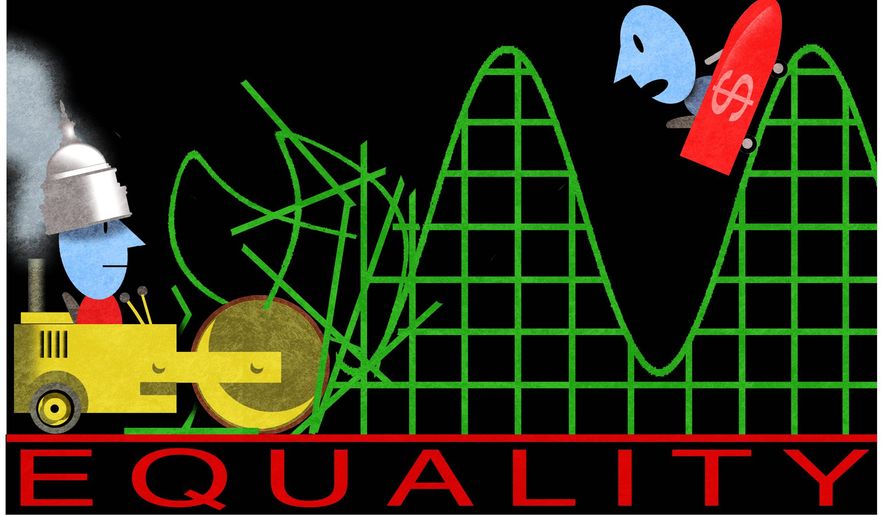OPINION:
The midterm elections highlight Americans’ frustrations with inflation and the general direction of the country — with major factions wanting quite different new destinations.
Stronger economic growth would help salve wounds and reduce conflict. But above all, prosperity is a cultural challenge — cultivating common purpose and trust among businesses, workers and citizens in the public square.
COVID-19 and new technologies accelerated disruptive changes in where and how people work.
The crisis removed several million Americans from the workforce. Those with skills in demand are resisting requests to return to offices and are seeking higher wages.
Businesses are responding with more robots and embracing artificial intelligence. Those investments reduce costs and boost growth, but less overbearing management would help too.
Work from home raises productivity for the ambitious — daily commutes on crowded roads and transit systems are mentally draining, and hovering bosses are a distraction. As many as half of employees are disaffected and doing the bare minimum.
In July 2021, the CEO of the Michigan mortgage lender UWM ordered all workers back to their desks — anyone wanting to work from home could find another job. Now his best employees needlessly waste too much time commuting, and his managers report losing many high-quality workers.
This approach penalizes the best employees by treating them the same as slackers.
Bowing to the benefits of having everyone interacting in person some of the time, Apple is requiring workers to be at their desks Tuesdays and Thursdays and one other day as determined by individual teams.
This approach permits better mentoring for younger workers and helps newer employees assimilate into the corporate culture.
As for those tempted to abuse and disengage, employee engagement is easy to track nowadays, but simple metrics such as keystrokes and client contacts must be supplemented by other sound management practices that encourage quality engagement — for example, regular staff meetings where individuals report on how they are approaching projects and offer solutions to challenges affecting the team and organization.
COVID-19, Russia’s aggression in Ukraine and China’s threats toward Taiwan, COVID policies and crackdown on private enterprises lay bare that globalization and free markets are great at cutting costs but not at managing risks. Those cultivate long, brittle supply chains with multiple firms in many countries making essential contributions to products — such as simple computer chips in automobiles. They also beget threats to basic sustainability and social stability — for example, global dependence on Ukrainian grain and Russian natural gas.
China’s dominance in solar panels and preeminent positions in EV batteries and many other markets — often obtained through subsidies, protection and subversion of the World Trade Organization rules and dispute settlement — have slowed American growth by denying U.S. businesses markets and scale to invest in new technology.
Those create a strategic vulnerability in the event of conflict in the Pacific that dwarfs anything the Russians could impose.
Washington could better manage globalization — secure supply chains and spread R&D costs to maintain leadership in high tech — by linking together allies and emerging nations that can be persuaded to compete by fair rules by rejoining the Trans-Pacific Partnership and negotiating similar arrangements with the European Union and the United Kingdom.
Even without the war in Europe, droughts, floods and rising temperatures are permanently disrupting global food supplies and damaging commercial networks, for example, by lowering water levels in the Rhine and Mississippi rivers.
The United States and other nations are devoting too little of their infrastructure and climate change budgets to mitigation. We may already have reached the tipping point where even the best CO2 emissions efforts will not be enough to halt temperatures from rising to new, more disruptive equilibriums.
The American West faces a permanent water crisis and the president’s infrastructure program does too little to fix leaky reservoir and distribution systems and even less to correct a bias in water allocation against agriculture and in favor of industry.
Semiconductor factories use lots of water and would be better built in the East than Arizona. Addressing all this butts into traditional tensions — business vs. labor, protectionism vs. multilateralism, national purposes vs. regional rivalries. Advancing through compromise is often impossible when progressives view conservatives as not just wrong but evil and conservatives view their opposites as cynical and dumb.
North America’s abundant resources have often been credited as the wellspring of American progress.
Just as important has been our historic belief in a noble calling and shared purpose. Without those to inspire — a faith in American exceptionalism — all the natural abundance heaven can bestow is to no avail. Look at Venezuela.
We are not yet a backward banana republic, but when President Biden paints opponents as semi-fascists and others refuse to accept the outcome of elections, we are tumbling into the conditions of state entropy.
Don’t believe it? Look at our porous border, declining public safety and school performance in major U.S. cities.
• Peter Morici is an economist and emeritus business professor at the University of Maryland, and a national columnist.




Please read our comment policy before commenting.